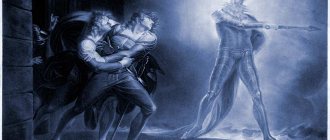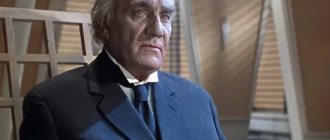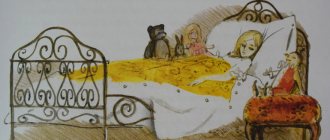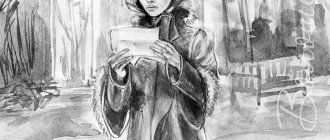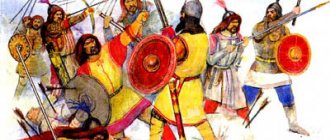Plot
Ben was a good pilot and, having flown many thousands of miles in his life, he still enjoyed flying. For a long time he worked in Canada, then in Saudi Arabia in an oil export company that carried out oil exploration along the coast of Egypt. Ben drove geologists around and could land a plane anywhere within an inch of his life. But then the company abandoned the search for oil and, at 43, Ben was left without a job. He gave everything that he managed to save during his life to his wife. This should have been enough for her to live a normal life and she, without hesitation, went to her homeland in Massachusetts, leaving Ben with their son Davy, who was barely ten years old.
Davy grew up as a rather reserved child. The mother was indifferent and showed no interest in her son, and the boy was completely afraid of his father’s slightly rude and harsh statements. And Ben also never knew how to behave with his son.
Now Davy and his father were flying on a small rental plane to a secluded bay of the Red Sea. Ben wanted to make money by filming sharks underwater for a television company. He was not happy that he had to take Davy; the boy did not tolerate the flight well. After landing the plane in the bay and giving his son some instructions, Ben left to film the sharks. One of the predators showed too persistent an interest in the pilot, and he had to return to shore.
When father and son sat down to dinner, Ben suddenly realized that he had only taken beer for himself and again did not think about Davy. The man became irritated, looking at his overly obedient son, and was angry with himself, realizing that he was a worthless father. Davy wondered if anyone knew they were in this bay and if anyone could find them here. It took Ben a while to realize that the child was afraid to be left alone when he went out to sea with the sharks. Ben himself was afraid of sharks, but he wanted to earn money to send his son to his mother.
When Ben went underwater for the second time and was almost done filming, one of the sharks attacked him. Gathering his last strength, losing consciousness, he climbed ashore. Davy ran to his father and saw the bloody body - the limbs were cut by shark teeth. Alternately losing consciousness, then regaining consciousness, Ben tries to cheer up his son, with careful advice to suggest what to do. The father understands that their lives are now in the boy’s hands. He has no right to die to save his son. Only once did Ben try to teach his son to fly a plane, and now he was happy to notice that Davy turned out to be a very smart guy.
Davy saved his father’s life and his own, and now Ben understands that the time has finally come to improve his relationship with his son and gain trust in him.
Summary of the story
Ben was a pilot who had flown thousands of miles. He worked in Canada for quite a long time. But after being transferred to work for an oil export company, he had to move to Saudi Arabia. The essence of his activity in the new place was to search for deposits of a valuable resource on the coast of Egypt. The uneven terrain, the features of the terrain - all this forced Ben to be as careful and precise as possible when landing the plane, down to the inch.
The hero had no idea that he would soon become unemployed, because the company had stopped searching for new oil fields . The 43-year-old man gave the accumulated money to his wife. For a long time the family did not live together, there was no closeness between husband and wife. The woman took the money and went to her parents in Massachusetts. Ben was left without savings with his ten-year-old son Davy.
The silent boy never shared his experiences and emotions with his father, secretly hiding them in the depths of his soul. The mother never took care of her son. And the constantly rude, harshly speaking father only frightened Davy. Ben wanted to find a common language with the boy, but did not know where to start.
The temporary part-time job of the father of the family allowed him to stay afloat. He was engaged in underwater filming of sharks and worked for a television company. Taking Davy with him, he went by plane to a remote cove in the Red Sea. The son did not tolerate the flight well, causing his father to repeatedly regret such a trip.
Upon landing, Davy asked his dad for water. But he just threw up his hands, since he only took beer with him. Ben dived into the sea to film sharks, but suddenly an underwater predator attacked him . The man could hardly get out, his limbs were bitten by sharp shark teeth. The son was seriously scared, he just watched his father lose consciousness, come to his senses again, and listened to words of reassurance. The pilot understood that no one knew about their location.
Gathering his will into a fist, the man put his son at the helm and supervised the flight process. The boy listened to his parent unquestioningly. The landing in Cairo was successful. Ben was immediately sent to the operating room where his arm was amputated.
The former pilot was recovering quickly. He could no longer fly the plane or do underwater photography, but he was finally able to find a common language with his son.
Summary Aldridge Father and Son (The Last Inch) 2nd option
The story is, indeed, about a father and son—a complex relationship. The heroes themselves have complex characters, and the situation in which they find themselves is unusual.
Father Ben is a brave dreamer. He has a family - a wife and son, but because of his work in the desert, where he is looking for oil, they are forced to survive in an almost wild village. Ben is harsh and even rude. Here he also loses his job, as the company decides to close his fruitless project. Now Ben doesn’t want to get a regular job, because he can’t stand routine, but due to his age, he can no longer be a pilot. The wife is tired of all this, she decides to return home. That's what he does! But he leaves Ben their son... It’s hard to blame her, since the son took after his father in terms of complexity of character. A boy of about twelve, Davy, is very withdrawn and gloomy. He is afraid of his impulsive father, and is not happy that he has to stay with him. For a father, a child is a hindrance. Ben dreams of earning money and sending his son home.
And so he is offered a job - almost secret. A television company needs underwater footage of sharks. Nobody should know about this. Ben has to take his son with him, even though he is sick of the plane. While his father films predators, the boy is forced to be bored alone.
This story is also called symbolically "The Last Inch". During filming, one of the sharks attacked the operator himself. Ben barely got out of the water - all his limbs were badly damaged, he was bleeding. And then the boy has to drag his father to the plane. To save Ben's life, Dani must fly the plane. He knows a little, but is very afraid. Ben himself constantly loses consciousness and cannot help him. And yet they flew to the city, but the most difficult thing is the last inch, where they need to land the plane well so that all efforts are not in vain.
The story teaches self-confidence and ends well.
Rate this piece:
- 3.86
Votes: 193
Read summary The Last Inch. Brief retelling. For a reader's diary, take 5-6 sentences
Father and son
"Father and Son" is an excerpt from the story "The Last Inch" by James Aldridge. The title of the passage is conditional; in the original it is not titled in any way.
Pilot Ben was attacked by a shark while filming underwater. His son, ten-year-old Devi, had to drag his wounded father to the plane.
Constantly losing consciousness, Ben lay down on a towel and pushed off the sand with his feet while his son dragged him to the plane. So that his father could climb into the passenger seat, the exhausted Davy piled stones and pieces of coral in front of the plane and dragged his father, weakened from great blood loss, along this ramp.
You can do anything in life, Davy,” he said in a weak voice, “if you don’t strain yourself.” Don't stress yourself...
Continued after advertisement:
Meanwhile, it began to get dark - the rising wind covered the sky with dust and sand. Ben hoped that this wind would make it easier for them to take off, but if it blew too hard, they would simply not notice the airport lights and fly past.
Having tied a towel around his father, Davy dragged him into the passenger seat of the plane. Only now the boy realized that the role of the pilot goes to him. Ben sincerely regretted that he had not bothered to get to know this gloomy boy, and now he could not find the right words to cheer him up.
Following his father's instructions, Davy started the engine and with difficulty lifted the plane into the air, overcoming the pressure of the wind. Ben kept losing consciousness, but was not going to give up. He clung to a thin thread of consciousness, “after all, in it alone was the salvation of his son.” Ben led, trying to control Davy's every action. He regretted that he had not explained everything to his son earlier, when the roar of the engine and the howl of the wind did not interfere with conversation.
You can't lose your mind and constantly do stupid things!
Finally, the plane took off, and Ben was plunged into darkness. He woke up from the sound of interruptions in the engine and helped his son fix the problem. Davy remembered a map and knew how to use a compass. Ben told him to fly along the Suez Canal and then turn towards Cairo, and he lost consciousness again. Left alone at a kilometer altitude, Davy realized that he would never be able to cry again.
Briefly exists thanks to advertising:
Ben was unconscious almost the entire way. He woke up just before landing. Ben rose with difficulty in his chair and began helping his son again.
Getting a plane into the air and flying it is not so difficult, but landing it on the ground is the task!
They miraculously missed a huge four-engine plane, which was taking off at the airport at that moment. A moment before landing, the plane lost speed, but Davy still managed to land it and survive.
To the surprise of Egyptian doctors, Ben survived, although he lost his left arm along with the ability to fly airplanes. Now he had one concern: to find a way to his son’s heart, to overcome the last inch separating them.
Inspired by Egypt
The story “The Last Inch” is a pearl of short prose by James Aldridge. It is invariably included in the writer’s collected works. And world cinema has immortalized the plot of the work on the screen. Domestic audiences are well aware of the cult film from directors Nikita Kurikhin and Theodor Vulfovich. It was released on Soviet screens in 1958. The main roles were played by Slava Muratov (Davey) and Nikolai Kryukov (Ben).
James Aldridge believed that literary fiction should be based on real life experience. “The Last Inch” was no exception. The main character of the story is a professional pilot. The writer was well acquainted with flying - in his youth he attended London pilot courses.
The events of the work develop in Egypt. Aldridge knew about this exotic country not from books. He lived in Cairo for a long time and even dedicated the book “Cairo. Biography of the city". The idea for “The Last Inch” was born after visiting Shark Bay in Egypt. Aldridge subsequently moved his literary heroes there - the pilot Ben and his ten-year-old son Davey.
Let us remember how the events of the story “The Last Inch” developed.
Popular retellings today
- Odoevsky
Vladimir Fedorovich Odoevsky was born from the marriage of a prince and a serf peasant woman in 1803. Subsequently, he became a writer, musicologist and philosopher working in the era of romanticism. - The Belly of Paris - a summary of Zola's novel
The genre of the work is realistic prose, the events of which unfold in the mid-nineteenth century during the establishment of the power of the Second Empire. - Snow - a summary of Paustovsky's story
Singer Tatyana Petrovna, together with her daughter Varya and her nanny, came from Moscow to a small Siberian town and settled in the house of old Potapov. But a month later the old man was gone. The tenants were left alone in the house, except for a cat named Arkhip. - The Three Musketeers - a summary of the novel by Dumas
An eighteen-year-old young man goes to Paris to enlist in the service with a letter of recommendation to the captain of the royal musketeers. Along the way, his adventures begin. In Maine he duels with Count Rochefort
Online reading of the book Father and Son Father and Son
III
It was ten o'clock in the evening. I sat on the balcony with one Russian and smoked a cigarette. Suddenly a servant shouts to us from below that Sinvar’s master has just sent for his son. I was about to reprimand the servant for his intrusiveness, but the Russian held me back. Curiosity took possession of him.
- Wait! - he said. - Let's see what happens. It's so late, and he sends for Pavo.
We sat and smoked silently for some time. Pavo arrives. His father comes out to meet him.
“Listen,” he says. - I lost nine thousand on the damned roulette. I was already in bed, but I couldn’t sleep. I am very sorry for this money, this is exactly what I promised to donate to the local church. We need to win back.
I will not rest until I hold this money in my hands again. Let's go back to the hall.
Pavo was dumbfounded. Even Pavo, an avid gambler, is amazed. He is at a loss for words.
- Why are you standing there! - exclaims the father. - The game goes on well after midnight; We still have many hours ahead of us. There's no time to waste.
And it started again.
- Let's go! - the Russian told me. - Let's go to the hall. That's how things will be.
The game was in full swing. As always, as midnight approached, they began to risk larger sums than at the beginning of the evening. The prince, gloomy and calm, sits in his place, bets and wins. There are twenty thousand on the table in front of him. He plays for three chances at once, thinks everything over with the greatest calm, and bets, sometimes without counting, handfuls of gold. Nothing bothers him, he doesn’t even notice the Romanian, pale with rage, who again began to lose after half an hour of even and successful play. He also puts money in piles, every free minute he tries to count them and sort them into thousands in order to give himself an account of the state of affairs, but he is too worried, his hands are shaking, he needs to keep an eye on the wheel all the time, and he finally gives up all sorts of calculations. And how stupidly he plays! He bets on four numbers at once, with a cross, and, like a stubborn child, does not want to give up the same numbers. He would rather leave the table penniless than give up this chance. And he keeps increasing the stakes.
The prince glanced at the door as father and son appeared and moved to give them room near him. Then he continued to play, just as gloomily and completely calmly. He seemed to be highly respected among the players.
“Pavo,” says the owner of Sinvara, “play as always, as you want.” Here's the money. You always have luck on red, don't you? Bet on red.
Pavo asks his neighbor, an old one-armed military man, how many times it came out red, and he reports that it came out red seven times in a row. That's why Pavo bets on black.
“Twenty-five, red, odd and pass,” the croupier announces and rake in the money.
“You started badly, Pavo, but continue in your own way,” says Sinvara’s owner with disappointment. - How many times do I have to tell you that I don’t have bins full of money? Now bet on red.
But red lost. Finally, after eight laps, black came out and one of the numbers in the Romanian's square, which brought him back to his feet. Enraged by his failures, driven to the extreme, he this time threw the maximum bet on his four figures and, in his inveterate stubbornness, was at that moment indifferent to winning or losing. When the ball landed on one of his numbers, he automatically called the servant standing behind the prince's chair and silently handed him a credit card. And again he began to place with trembling hands.
“Pavo,” the father says again, “you lost again.” You're out of luck at all. If I let you squander my money, it's for your own good. I want to fix you for this night. Pavo, do you understand what's going on?
Pavo understands perfectly what's going on. He sees that dad is already overcome by the intoxication of the game, and for him it is already a joy to play, even if he loses. He experiences the throes of the game like few others do, and when the game gets big, he takes his breath away and hears his heartbeat. Pavo understands all this, and how!
Suddenly he begins to think, becomes inattentive, absent-minded. The croupier notices to him that he, an experienced player, is playing against himself, and secretly marvels at Pavo. I myself notice that Pavo over and over again reaches for the money he has just bet, as if he wants to save it before the ball stops. Is he becoming more reasonable? Or is he afraid of losing?
My Russian friend takes me to a sofa in the back of the room and starts talking about Pavo. Did I notice a sudden change in his playing? Oh, Pavo is basically cunning as hell, he understands a lot of things very well! And, pointing to father and son, the Russian says:
“Really, the son is not as crazy as the father.” Pavo has already noticed that the gambling passion has gripped his father and wants to keep him. It's very funny, but really, he's trying to hold back the old man. Great, isn't it? Of course, it is very important for Pavo that his father does not go broke.
We continue to sit on the couch. Something unusual is happening at the roulette table, everyone is standing around the owner Sinvar and his son. Nobody plays baccarat; even three peasants from the mountains in big gray cloaks with metal belts and old shopkeepers who were playing for drinks sitting at the door - and they stood up and intervened in the crowd around the roulette wheel. We are coming too.
- Attention! - the Russian tells me. He's very excited.
The owner of Sinvar decided to take up the number thirteen again. Out of impatience and excitement, he now manages everything himself. He rummages through the money with thick, trembling hands, looking for and crumpling dirty credit cards, trying to count them and put them into bundles. His rings sparkle in this pile of dirty banknotes. He is silent and Pavo sits next to him, also not saying a word. His face is very gloomy.
- Thirteen! - announces the dealer.
Master Sinvar shudders, and even Pavo looks completely stunned. What luck with such a ridiculous game! The latest success causes significant damage to the bank. The croupier counts out the money with calm movements. Nothing can surprise this man, he knows all the vagaries of fate, he has seen the sights. The prince stands undecided for a moment, but almost immediately takes his money, divides the gold and papers, and stuffs everything into his pockets. He demands a glass of wine, drinks it in one gulp, gets up - he’s finished the game. As he leaves, he shoves credit cards to all the servants he comes across along the way, left and right.
The owner of Sinvar pushes his son by the elbow and looks at him with feverish eyes.
- See! See! And you wanted to teach me to play! Here I will shut you all up!
He laughs loudly and abruptly, turning to the surprised spectators. Intoxicated with his happiness, he throws money again for thirteen.
- Leave it, leave it where I put it! - he shouts. — Thirteen is not a simple number.
But the croupier scoops up his money with a spatula. He hesitates, apparently he would like thirteen to come out again, provoking the rich player, who is still sooner or later doomed to be his victim.
After four unsuccessful attempts with the same number, Sinvar's master becomes impatient. He angrily turns to his son:
“Listen, Pavo, I won’t bet on thirteen anymore.” I lost enough on this stupid number.
He gets more and more irritated; drives out the servant, whose boots squeak; casts bitter glances at the Romanian, who forgets to collect his winnings and thereby delays the game. The owner of Sinvar begins to be burdened by the curious people who surround him. Do they really have absolutely nothing to do? He calls a girl from the crowd and says:
“I gave you the gold one, didn’t I?” The girl blushes and squats deeply.
- Why don’t you leave, my child?
Her pink lips move, but she says nothing and lowers her eyes. The owner of Sinvara looks at her more carefully and gives her another gold one.
- Here, take it. Come see me after the game, after midnight.
The girl blushes to the root of her hair and again curtsies respectfully. Then she makes her way through the crowd, smiling at everyone, and leaves.
Master Sinvara returns to the game.
“Flies are hitting the windows,” he says. “Something always gets in the way here.” Drive away the flies.
His money is quickly disappearing. Romanians are lucky. Sinvar's master looks at his luck with the greatest displeasure.
- Look, I only have a few unfortunate pieces of paper left! - he turns to Pavo. “But I won’t give up, I’d rather lose everything.” Now I bet a thousand on red, maybe that's my color.
Red won.
“Maybe red really is a lucky color.” I'll bet on it again. Let's try. Red lost. Then Sinvar's master lost his temper completely.
- Go away! - he shouts to his son sitting next to him. - You bring me misfortune. Can't you see that you're ruining me? I have to recoup, I want my money back. “But at that very moment, remembering the role he wanted to play, he adds: “You see what I do for you.” I'll teach you a lesson.
“I’ve already been taught a lesson,” Pavo mutters.
- Shut up, you haven’t been taught a lesson properly yet. You'll start again. I do all this for you, you hear! Get out.
Pavo got up and left.
